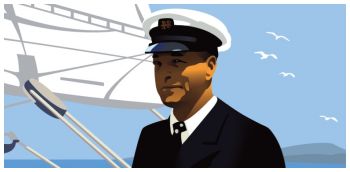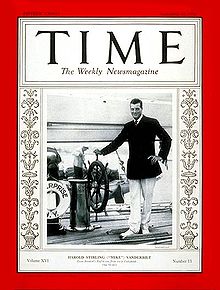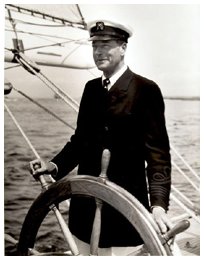Yves GARY Hits: 11652
Category: OWNERS
 Harold Stirling Vanderbilt (July 6, 1884 – July 4, 1970) was a railroad executive, America’s Cup yachtsman with three Cup defenses, commodore of the New York Yacht Club, and originator of contract bridge.
Harold Stirling Vanderbilt (July 6, 1884 – July 4, 1970) was a railroad executive, America’s Cup yachtsman with three Cup defenses, commodore of the New York Yacht Club, and originator of contract bridge.
He is the third child and second son of William Kissam Vanderbilt and Alva Erskine Smith and great-grandson of the shipping and railroad tycoon Cornelius Vanderbilt.
His childhood was spent visiting his family's homes in New York and Newport and frequently sailing to Europe, and around the world on his family's yachts. He gained a love of sailing at a young age and later owned his own yachts, winning six "King's Cups" and five Astor Cups at regattas between 1922 and 1938. He served as commodore of the New York Yacht Club from 1922 to 1924.  Vanderbilt's yachts the "Enterprise" (1930), the "Rainbow" (1934) and the "Ranger" successfully defended in the America's Cup races in the 1930s. He and a group of others developed a set of yachting rules and in 1960 the International Yacht Racing Union (predecessor to the International Sailing Federation or ISAF) adopted the rules that Vanderbilt and the Americans had developed over the previous quarter century.
Vanderbilt's yachts the "Enterprise" (1930), the "Rainbow" (1934) and the "Ranger" successfully defended in the America's Cup races in the 1930s. He and a group of others developed a set of yachting rules and in 1960 the International Yacht Racing Union (predecessor to the International Sailing Federation or ISAF) adopted the rules that Vanderbilt and the Americans had developed over the previous quarter century.
During World War I, he was assigned to command the Block Island anti-submarine sector. Upon his reassignment the officers and men of the Block Island sector presented him with an engraved naval officer's sword as a token of their esteem. The sword is now displayed at the Marble House in Newport.
During the Second World War, Vanderbilt's yachts Vagrant and Vara were seized by the United States Navy. The Vagrant was designated as YP-258 and later as PYc-30.
Harold Vanderbilt had a keen interest in the success of Vanderbilt University in Nashville, Tennessee, founded in 1873 through the financial sponsorship of his great-grandfather. A longtime member of the university's Board of Trust, he served as its president between 1955 and 1968.
 He was also a bridge authority whose revisions of auction bridge scoring principles created modern contract bridge, also a system-maker and a champion player. His social standing made the game fashionable. In 1928, he endowed the Vanderbilt Cup awarded to the winners of the North American team-of-four championship. In 1932 and again in 1940 he was part of a team that won his own trophy. Vanderbilt also donated the World Bridge Federation Vanderbilt Trophy, awarded from 1960 to 2004 to the winner of the Open category at the quadrennial World Team Olympiad, and since 2008 to the winner of the corresponding event at the World Mind Sports Games.
He was also a bridge authority whose revisions of auction bridge scoring principles created modern contract bridge, also a system-maker and a champion player. His social standing made the game fashionable. In 1928, he endowed the Vanderbilt Cup awarded to the winners of the North American team-of-four championship. In 1932 and again in 1940 he was part of a team that won his own trophy. Vanderbilt also donated the World Bridge Federation Vanderbilt Trophy, awarded from 1960 to 2004 to the winner of the Open category at the quadrennial World Team Olympiad, and since 2008 to the winner of the corresponding event at the World Mind Sports Games.
In 1963, Vanderbilt assisted the Preservation Society of Newport County in acquiring the Marble House summer estate in Newport. The Marble House was sold by his mother more than thirty years earlier. Successful in their bid, the property was converted into a museum and has been open to the public since the mid-1960s.
Harold Stirling Vanderbilt died in 1970. He and his wife, Gertrude Conway Vanderbilt, are interred at Saint Mary's Episcopal Cemetery in Portsmouth, their graves marked with only a simple flat stone. Many documents and artifacts related to the life of Harold Sterling Vanderbilt are preserved and on display at the Marble House in Newport, Rhode Island.
|
ENTERPRISE - 1930 |
RAINBOW - 1934 |
RANGER - 1937 |

Harold Stirling Vanderbilt - Wikipedia, the free encyclopedia
- Harold Stirling Vanderbilt, Inducted 2014 - Rhode Island Heritage Hall of Fame
- Vanderbilt, Harold - 2011 Hall of Fame - National Sailing Hall of Fame
- Harold S. Vanderbilt, 1993 Inductee - Herreshoff Marine Museum & America's Cup Hall of Fame
- Harold Vanderbilt - Sailing World
- Harold S. Vanderbilt launches a new J-Class yacht to defend the America's Cup in...HD Stock Footage - YouTube
- J-class yacht Ranger wins America's Cup by defeating Endeavour II of Britain by 4...HD Stock Footage - YouTube
